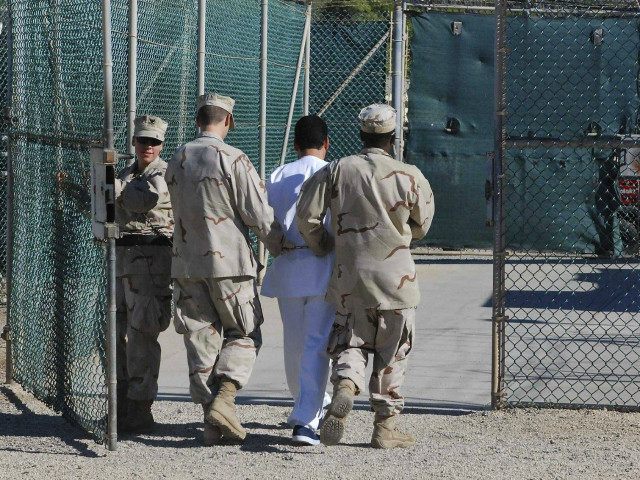WASHINGTON, D.C. — The Obama administration has transferred three prisoners out of the U.S. military detention facility in Guantánamo Bay, Cuba, in the last few days — one was taken to Italy and two were sent to Serbia, bringing the prison population down to 76, according to the Pentagon.
On July 10, the U.S. Department of Defense (DOD) announced that Yemeni Fayiz Ahmad Yahia Suleiman had been sent to Italy.
The following day, DOD reported that Muhammadi Davlatov of Tajikistan and Mansur Ahmad Saad al-Dayfi of Yemen had been transferred to Serbia.
Of the 76 prisoners currently being held at the Guantánamo facility, also known as Gitmo, 27 have been approved for transfer to another country.
The Obama administration is expected to reduce the prison population by up to 20 more detainees, to 56 by the end of July, according to some news outlets citing unnamed sources.
Four of the first 20 jihadists taken to the facility when it first opened in January 2002, dubbed the “worst of the worst,” still remain at Guantánamo. Three of those prisoners have now been approved for transfer. The detainees who were transferred in the last few days do not appear to be among the so-called “worst of the worst.”
“The United States is very grateful to the Government of Italy for its continued assistance in closing the detention facility at Guantanamo Bay,” said Lee Wolosky, the U.S. special envoy for Guantánamo’s closure, referring to the July 10 transfer and describing the effort to close the prison as a “shared goal.”
Reuters reports that a Pentagon spokesman declined to comment on whether the Yemeni terrorists would be subject to detention and referred that question to the government of Italy.
Italy reportedly said it was taking him on “humanitarian grounds” without elaborating further.
“The United States is grateful to the Government of Italy for its humanitarian gesture and willingness to support ongoing U.S. efforts to close the Guantanamo Bay detention facility,” said the Pentagon in a statement announcing the transfer. “The United States coordinated with the Government of Italy to ensure this transfer took place consistent with appropriate security and humane treatment measures.”
Reuters notes, “The Yemeni man was arrested by Pakistani police and transferred to U.S. custody in December, 2001, meaning he had been in U.S. detention for more than 14 years, according to U.S. military documents posted online by the WikiLeaks website.”
The Obama administration, which rolled out its plan to shut down the facility earlier this year despite bipartisan opposition in Congress, also thanked the government of Serbia for taking Gitmo detainees.
U.S. Secretary of State John Kerry said, “The United States appreciates the generous assistance of Serbia as the United States continues its efforts to close the Guantanamo Bay detention facility.”
“The United States is grateful to the Government of Serbia for its humanitarian gesture and willingness to support ongoing U.S. efforts to close the Guantanamo Bay detention facility,” added the Pentagon in a statement. “The United States coordinated with the Government of Serbia to ensure this transfer took place consistent with appropriate security and humane treatment measures.”
The July 11 transfer marks the first time that Serbia has accepted former prisoners. Under President Barack Obama’s watch, an estimated 31 countries have resettled more than 100 detainees.
According to the Wall Street Journal (WSJ):
Mr. Dayfi had been cleared for release in October by an interagency review board. The military thought at one point that he was a member of al Qaeda with prior knowledge about the Sept. 11, 2001, attacks and other plots against U.S. interests, according to leaked prisoner documents.
Mr. Davlatov—who the military had thought had potential ties to al Qaeda, the Taliban and a Tajik terror group—had been recommended for transfer by the Bush administration in 2008 and the Obama administration in 2009.
The Obama administration’s plan to close down Guantánamo involves moving prisoners who cannot be released, including those who are facing military commissions or are deemed too dangerous for transfer, from the facility to U.S. soil, which is prohibited by a bipartisan legislation signed into law by the president.
Although the Obama camp argues that prisoners undergo a rigorous review process before they are released, the office of the Director of National Intelligence (ODNI) reported in March that about 30 percent of detainees who have been released are suspected or confirmed to have re-engaged in terrorist activities.
Moreover, a top Pentagon official admitted in March that detainees released from the U.S. military prison in Cuba have killed Americans.
In June, various news outlets reported that the government of Uruguay had lost track of a former Gitmo detainee from Syria who was transferred to its care in 2014.

COMMENTS
Please let us know if you're having issues with commenting.